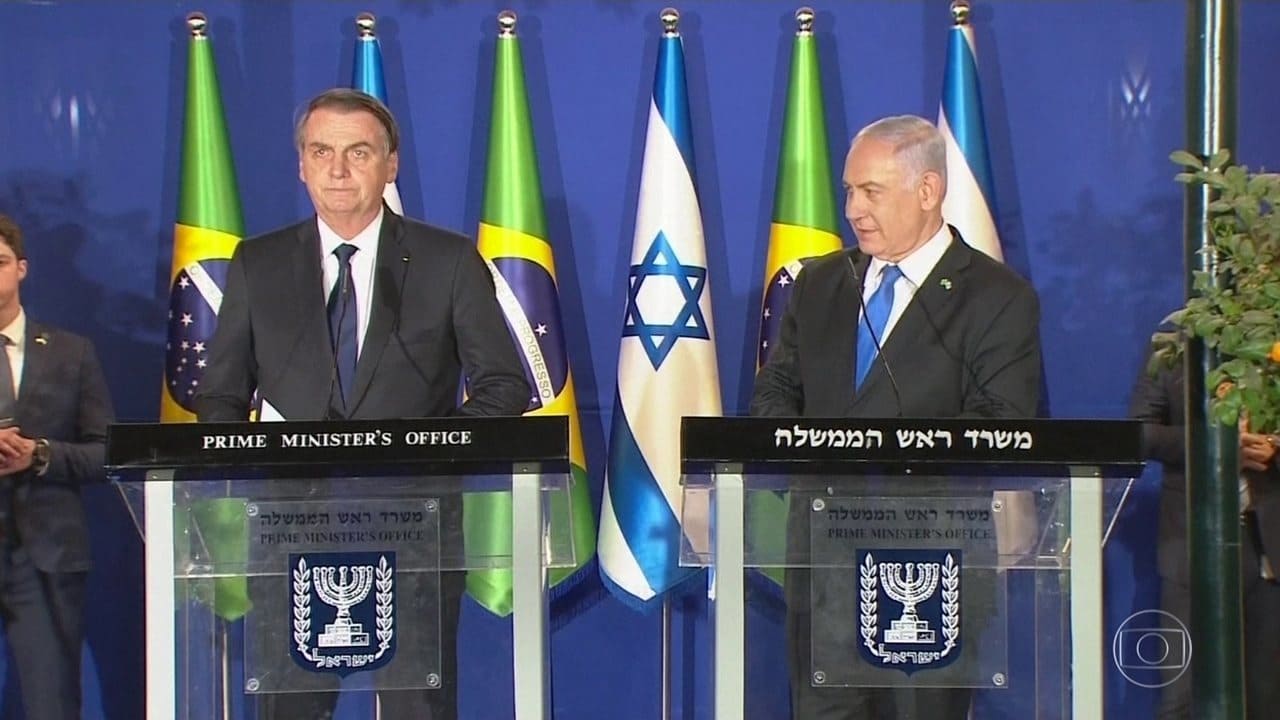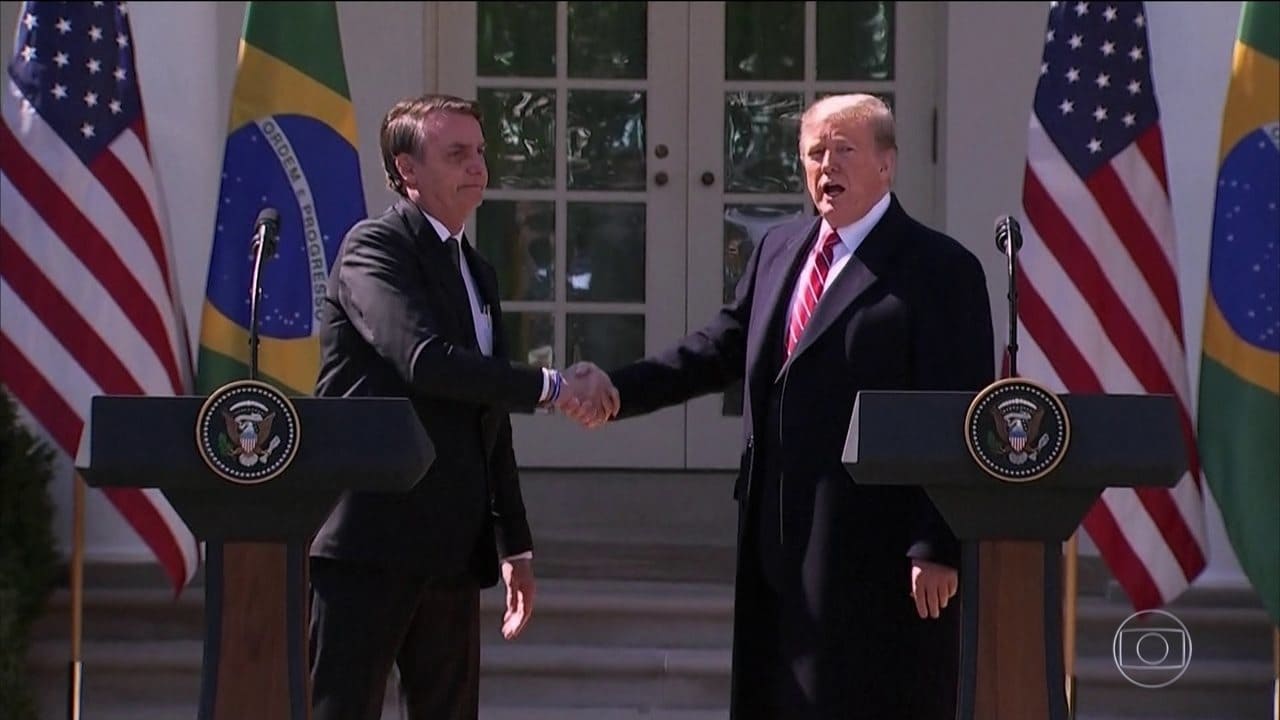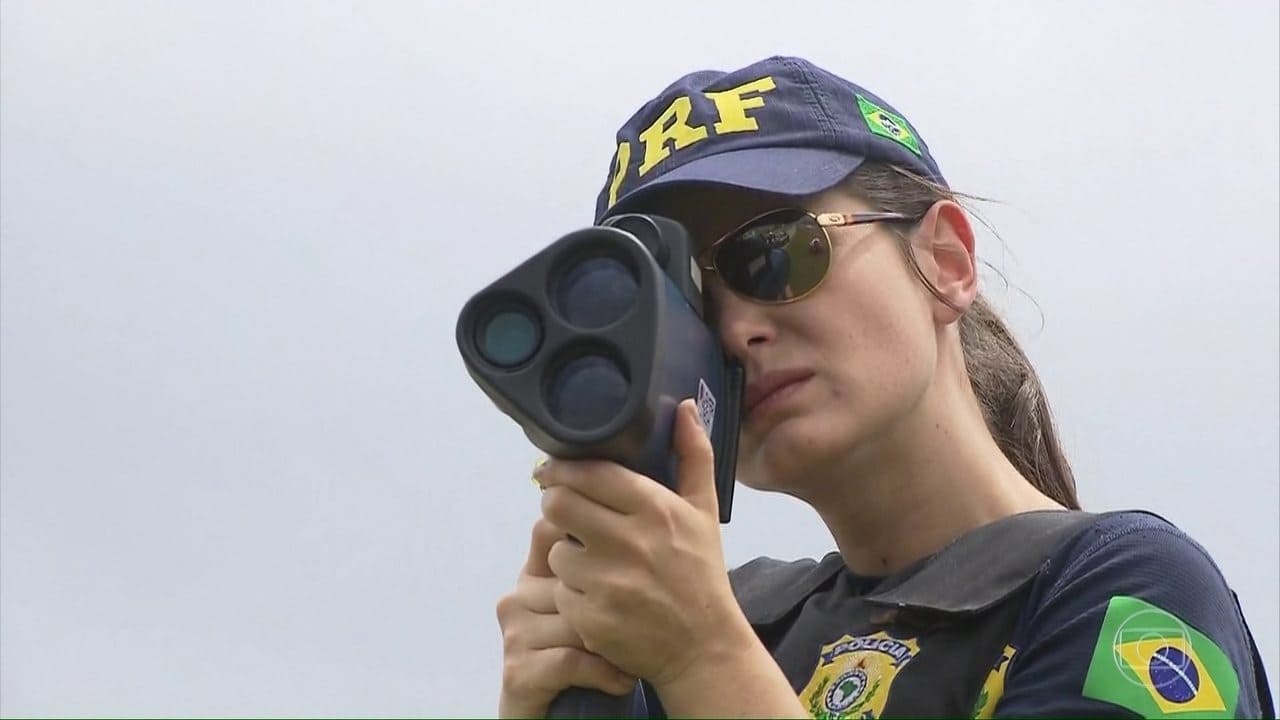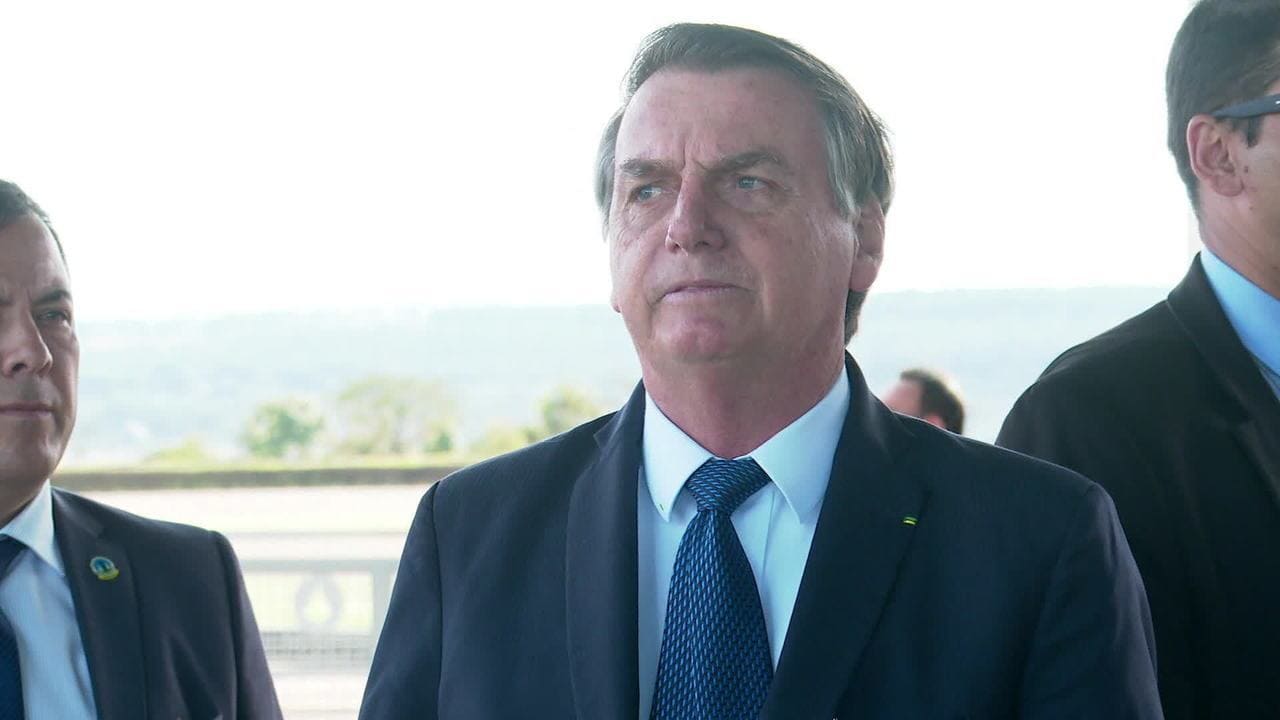On January 1, 2019, sworn in as the 38th President of the Republic: The president of the Federative Republic of Brazil, with a full year of his term, Bolsonaro speaks at the Planalto Palace:
On January 1, 2019, sworn in as the 38th President of the Republic
Among the management’s guidelines were: proposing reforms, “removing distrust and weight” from the government over those who work and produce, tackling economic crisis and unemployment, “restoring order”, and removing what it called “ideological bias” of foreign policy.
Retrospective 2019: Recall the Bolsonaro Government’s First Year Highlights
A year later, the 2019 Pension Reform or Bolsonaro Government Pension Reform was enacted, changes in military pensions were passed in Congress, and part of the anti-crime package passed in the House.
Without an organized congressional base, the government could not fully approve the interim measure (MP) that restructured the ministries.
The president also broke with the party for which he was elected, the PSL – left the caption and announced the creation of a new acronym, the Alliance for Brazil, which has not yet had time to meet the requirements to obtain registration with the Electoral Court.
Bolsonaro also incorporated a conservative agenda into the management – promoted religious acts in the Planalto Palace, elected social networks as a direct channel of communication and collected a series of controversial statements.
Recall actions and changes implemented by Bolsonaro in the first year of government:
Bolsonaro Government Ministries
Still in the election campaign, Bolsonaro promised, if elected, to reduce the number of ministries from 29 to 15. In government, however, it reduced the size of the reduction to 22 folders. There are military, technical and political ministers.
Bolsonaro attended, with ministers, flag-raising ceremony
‘PATRIOTISM’
Bolsonaro lives in the official residence of the Dawn Palace and usually summons ministers to the venue for morning meetings. Rather, they participate in national flag-raising ceremonies.
Often the theme “patriotism” is addressed in the president’s speeches and appears on the official agenda, with his participation in military ceremonies.
Retired Army captain, Bolsonaro has a general as deputy and seven military ministers or with military posts.
DICTATORSHIP
President Jair Bolsonaro makes positive comments about the period of the military dictatorship (1964-1985) quite often. In March, he ordered the Ministry of Defense to make “due celebrations” for the 55th anniversary of the 1964 coup.
In another episode, he questioned the legitimacy of the Truth Commission, established in the Dilma Rousseff administration to investigate crimes of dictatorship. Bolsonaro also praises Army Colonel Carlos Alberto Brilhante Ustra, whom he calls the “national hero.”
Ustra died in 2015 and headed, from September 1970 to January 1974, the Doi-Codi in São Paulo, the organ of political repression in the military regime. The Sao Paulo court appoints Ustra as a torturer.
RELIGION

The president always repeats that the state is secular, but points out that it is “Christian.” From this premise, it maintains proximity to evangelicals and dedicates part of the agenda to religious acts.
Bolsonaro is the first president to participate in the March for Jesus, the largest evangelical event in the country.
He also said he intends to choose a “terribly evangelical” minister for a seat in the Supreme Court (STF).
VICE MOURÃO
After two and a half years, Brazil again had a vice president in 2019. Reserve general Hamilton Mourão has held the vacant post since May 2016, when Michel Temer took over the Presidency of the Republic due to Dilma’s impeachment process Rousseff
At the beginning of the government, Mourão gave frequent interviews, but became the target of criticism from Councilman Carlos Bolsonaro (PSC-RJ), son of the president, and ideologist Olavo de Carvalho. Since then, its public demonstrations have diminished.
CHILDREN OF THE PRESIDENT OF THE REPUBLIC
Bolsonaro’s first year was marked by controversy involving family members.
Another, Federal Deputy Eduardo Bolsonaro (PSL-SP), said the government could issue a “new AI-5” if the left “radicalized”. At the end of 2018, still during the election campaign, a video released on social networks showed the deputy stating in a lecture that, to close the Supreme Court (STF), “one corporal and one soldier” were enough.
In addition, Senator Flavio Bolsonaro (no party-RJ), also the president’s son, is the subject of an investigation by the prosecutor for alleged practice of “crack”, popularly given to the practice of the cabinet keeping part of the salaries of employees.
SOCIAL NETWORKS

Social midias and social networks, Used throughout the campaign, social networking became Bolsonaro’s primary way of addressing supporters and supporters.
The president decided, for example, to broadcast live on a social network every Thursday night.
He also uses social media to advertise measures, publicize government actions, criticize opponents and even controversy, such as sharing a pornographic video at Carnival and asking what is “golden shower”.
Dawn Gate
The president’s contact with journalists is much more frequent than his predecessors. The Dawn Palace concierge is Bolsonaro’s main stopping point for almost daily interviews.
He made a habit of talking to supporters and conducting interviews on leaving or arriving at the official residence. In these stops, he has commented on personal and government plans, announced measures and attacked rivals. It was at the Alvorada Ordinance that Bolsonaro
- told a supporter to forget about the PSL;
- stated that he would tell the president of the OAB how his father disappeared in the dictatorship;
- said NGOs could be behind burning in the Amazon;
- said, in response to a reporter’s question, that “pooping every other day” helps reduce environmental pollution;
- announced that he would not be inaugurated by the elected president of Argentina
In addition, the president chose a spokesman, General Otavio do Rêgo Barros, who briefs weekly with journalists to report on government acts and answer questions.
POLITICAL ARTICULATION
Bolsonaro adopted the habit of personally bringing to Congress (in some cases on foot) projects considered important, such as the reforms of the Social Security and the federative pact.
The most frequent contact with parliamentarians is the responsibility of the leaders in the House and Senate and Minister Luiz Eduardo Ramos (Secretariat of Government), Army General.
Unlike predecessors, he rules without an organized base. It is not possible to estimate how many parliamentarians are part of the president’s coalition, which left the PSL, by which he was elected – Bolsonaro works to found the Alliance party for Brazil.
But the absence of a formal basis did not prevent Bolsonaro from seeking the support of deputies and senators in accordance with the projects analyzed and agreeing, like previous governments, to release amendments in exchange for votes.
However, the groundless articulation model has led to difficulties in approving interim measures and projects considered important.
ECONOMY
Bolsonaro’s first year was marked by a historic fall in the basic interest rate. Selic started 2019 at 6.5% and continued to fall to 4.5% in December, the lowest rate since the implementation of the targeting regime in 1999.
The government has freed part of the FGTS funds to stimulate consumption. Workers can withdraw up to $ 500 per FGTS account – and the total amount in the case of accounts with up to one minimum wage (currently $ 998).
Unemployment started high, reaching 12.7% in March, was slowly falling and reached October at 11.6% (12.4 million Brazilians), stable compared to last year
Despite the still high number, IBGE data show that the labor market is on a gradual recovery path, albeit driven by the increase in informality, which reached a record level in 2019 (41.2%).

The Minister of Economy, Paulo Guedes, has repeatedly defended the exemption of companies’ payroll, but the only measure in this direction came at the end of the year, with the Green Yellow program, which allows the hiring of young people collecting a smaller share than INSS and reducing other fees.
In December, the government also ordered the end of the 10% FGTS fine on unfair dismissals. Both measures, however, only start in 2020.
DECREES
In the first months of his administration, Bolsonaro bet on changes in legislation through decrees, which do not require the approval of deputies and senators.
But in June it saw the Senate pass an opinion to suspend two decrees on firearm possession and possession and ammunition use. He edited other decrees in place and sent the bill to Congress.
Providence
With the mayors, Rodrigo Maia (DEM-RJ), and the Senate, David Alcolumbre (DEM-AP), leading the negotiations, the National Congress approved the reform of Social Security. The promulgated text was based on the proposal sent earlier this year by the government.
This was the main reform approved in Bolsonaro’s first year. With the rules provided, the government estimate is to save $ 855 billion over the next ten years.
The government also defends the approval of the so-called “parallel PEC”, aimed at states and municipalities, which is expected to save $ 350 billion in ten years if all states and municipalities join.
MINISTERS
Bolsonaro often repeats that he gave the ministers carte blanche. But the endorsement has limits.
The insistence on creating a tax along the lines of the old CPMF cost the job, according to Bolsonaro’s determination, the head of the IRS, Marcos Cintra.
In inviting Sergio Moro (Justice) to be minister, Bolsonaro also spoke in “carte blanche” to the former judge. But in August, he announced the change of the Federal Police superintendent in Rio de Janeiro and tried to replace Director-General Mauricio Valeixo, chosen by Moro. “I’m the boss,” said the president.
Bolsonaro exchanged four ministers in the first year of a government that lived with constant changes in second and third echelons, some promoted by the president himself.
It was the case of Joaquim Levy. Minister of Finance Dilma Rousseff, Levy resigned from the presidency of the National Bank for Economic and Social Development (BNDES) after Bolsonaro stated that he was “up for grabs”.
This kind of attitude, known as “frying” in the political environment, was also used in the resignations of Ministers Santos Cruz (Government Secretariat) and Gustavo Bebianno (General Secretariat). The president postponed the dismissals, increasing the wear of the auxiliaries.
Bolsonaro himself told reporters that “to give someone a red card,” one has to let the person curl up.
SECURITY AND WEAPONS

The President of the Federative Republic of Brazil Jair Bolsonaro put into practice the arms campaign speech adopted and the “hard line” speech in public security.
The president signed a series of decrees to facilitate the possession and possession of firearms, the target of criticism from experts.
The public safety agenda included the submission to Congress of the anti-crime package and a bill with rules to exempt military and police officers from committing crimes in Law and Order Guarantee (GLO) operations.
Indians
The president has repeatedly criticized the “industry” of demarcating indigenous lands and defended agricultural production and mining in the areas – a bill to be submitted to Congress.
According to Bolsonaro, “the Indian is a human being just like us.” For the president, keeping indigenous people in demarcated reserves is treating them like animals in zoos.
RADARS
Bolsonaro also tried to block the use of mobile speed cameras on highways. But the federal court ruled that radars be used again for speed control on the roads.
The president also sent to Congress a bill that increases from 20 (forty) to 40 (forty) the limit of points for suspension of the National Driver’s License (CNH) and increases the validity of the document.
MORES
Jair Bolsonaro did not like a Banco do Brasil advertisement taken down. Aiming at young people, the play featured men with pink hair and expressions such as ‘make good’. “The mass wants respect for the family,” said Bolsonaro.
AMAZON AND ENVIRONMENT
Environmental policy has become a focus of friction for Bolsonaro, criticized for a dismantling of enforcement and unproven accusations to justify data or facts contrary to the government’s theses.
For these and other reasons, the president starred in non-governmental organizations (NGOs), researchers, foreign politicians (French President Emmanuel Macron and German Chancellor Angela Merkel) and a movie star (Leonardo DiCaprio).
Bolsonaro opted for Ricardo Salles as minister, placed a former rural deputy at the head of the Brazilian Forest Service, and said that expanding environmental protection areas “made progress difficult.”
CULTURE
Bolsonaro extinguished the Ministry of Culture, whose structure was transferred in January to the Ministry of Citizenship and in November to the Ministry of Tourism.
In the first year, the president had three special culture secretaries, the first of whom, Henrique Pires, accused the government of censoring LGBT-themed works upon leaving office.
The current secretary is the playwright Rodrigo Alvim, advocate of a conservative policy, aligned with Bolsonaro. Alvim chose for the Palmares Cultural Foundation journalist Sérgio Nascimento de Camargo, who defends the end of the black movement.
USA AND CHINA
Bolsonaro says he does not intend to meddle in the trade war between the United States and China. In his first year in office, he went three times to the United States and once to China and had private meetings with Presidents Donald Trump and Xi Jinping.
The first semester of government praised the approach to the United States, with announcements of measures such as visa-free travel for US tourists to enter Brazil.
Already the relationship with China advanced gradually. If before the president said that the Chinese should not “buy Brazil”, when visiting the country, Bolsonaro presented the Brazilian program of concessions and had the Chinese participation in a pre-salt megaleillion.
Possible Child Ambassador
Bolsonaro likes to say that he practices a foreign policy “without ideological bias”, with the desire to expand trade relations with different countries and contrary to financial and political support to leftist governments. In practice, Brazilian diplomacy has been guided by the theses of ideologist Olavo de Carvalho.
The president announced that he would appoint federal deputy Eduardo Bolsonaro, one of his sons, to the position of Brazilian ambassador in Washington. Without certainty of approval by the Senate and facing the crisis with the PSL, Bolsonaro stepped back and appointed the diplomat Nestor Forster, close to Olavo de Carvalho.
Socialist Bankrupt Venezuela
Bolsonaro also devoted special attention in his first year in office to the crisis in Venezuela. The Brazilian government has recognized opposition leader Juan Guaidó as president of the neighboring country.
Opponent of President Nicolás Maduro, Guaidó was received by Bolsonaro in the Plateau. An operation to send food and medicine to Venezuela, via Roraima, was launched.
South American Visinho – Argertina

In South America, Bolsonaro tried to influence the election of a neighboring country.
He quoted in speeches the crisis in Venezuela to defend Mauricio Macri’s reelection in Argentina. Before the election, he said “leftist bandits” threatened to return to power in the neighboring country.
Macri, supported by Bolsonaro, failed to reelect himself. The Argentines chose for president Alberto Fernández and, for vice, the former president Cristina Kirchner.
ISRAEL
The announcement made in the election campaign to remove Brazil from the United Nations (UN) did not materialize, as well as the promise to transfer the Brazilian embassy in Israel from Tel Aviv to Jerusalem.
In the embassy’s case, faced with possible Arab retaliation for Brazilian products, such as meat, Bolsonaro opened a business office in Jerusalem.
UN – United Nations
At the UN, the president made his first speech as head of state at the opening of the organization’s general assembly in New York.
At the meeting, he addressed topics such as preservation of the Amazon, sovereignty, socialism, foreign policy, indigenous peoples, Mercosur and economy, among others. Brazil reflected these opinions in votes within the UN:
- changed position and voted against a UN resolution condemning and calling for an end to the US embargo on Cuba;
- voted against resolutions tabled at the UN Human Rights Council calling for the
condemnation of Israel for repression of civilians on the Gaza Strip border; - voted against a bill presented at the World Health Organization (WHO) establishing hospital-medical support measures for Palestine.